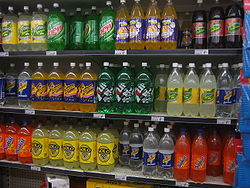
Fast Moving Consumer Goods
Encyclopedia

Soft drink
A soft drink is a non-alcoholic beverage that typically contains water , a sweetener, and a flavoring agent...
s, toiletries, and grocery items. Though the absolute profit made on FMCG products is relatively small, they generally sell in large quantities, so the cumulative profit on such products can be substantial.
Scope
The term FMCG refers to those retail goods that are generally replaced or fully used up over a short period of days, weeks, or months, and within one year. This contrasts with durable goodDurable good
In economics, a durable good or a hard good is a good that does not quickly wear out, or more specifically, one that yields utility over time rather than being completely consumed in one use. Items like bricks or jewellery could be considered perfectly durable goods, because they should...
s or major appliance
Major appliance
A major appliance, or domestic appliance, is usually defined as a large machine which accomplishes some routine housekeeping task, which includes purposes such as cooking, or food preservation, whether in a household, institutional, commercial or industrial setting...
s such as kitchen appliances, which are generally replaced over a period of several years.
FMCGs have a short shelf life, either as a result of high consumer demand or because the product deteriorates rapidly. Some FMCGs – such as meat, fruits and vegetables, dairy products and baked goods – are highly perishable. Other goods such as alcohol, toiletries, pre-packaged foods, soft drinks and cleaning products have high turnover rates.
The following are the main characteristics of FMCGs:
- From the consumers' perspective:
- Frequent purchase
- Low involvement (little or no effort to choose the item -- products with strong brand loyalty are exceptions to this rule)
- Low price
- From the marketers' angle:
- High volumes
- Low contribution marginContribution marginIn cost-volume-profit analysis, a form of management accounting, contribution margin is the marginal profit per unit sale. It is a useful quantity in carrying out various calculations, and can be used as a measure of operating leverage...
s - Extensive distributionDistribution (business)Product distribution is one of the four elements of the marketing mix. An organization or set of organizations involved in the process of making a product or service available for use or consumption by a consumer or business user.The other three parts of the marketing mix are product, pricing,...
networks - High stock turnover
See also
- Trade promotion managementTrade promotion managementTrade promotions management typically refers to one or more software applications that assist companies in managing their complex trade promotion activity.- Business problems addressed :...
- Category managementCategory managementCategory management is a retailing and supply management concept in which the range of products purchased by a business organisation or sold by a retailer is broken down into discrete groups of similar or related products; these groups are known as product categories...
- Good (economics)
- Grocery tradingGrocery tradingGrocery trading is an industry, historically not well known by the general public, in which grocery "traders" or grocery trading companies buy and sell blue chip grocery store items such as Cheerios and Alpo amongst the nation's largest supermarket chains based on price discrepancies from chain to...
- Market segmentMarket segmentMarket segmentation is a concept in economics and marketing. A market segment is a sub-set of a market made up of people or organizations with one or more characteristics that cause them to demand similar product and/or services based on qualities of those products such as price or function...
- Marketing strategyMarketing strategyMarketing strategy is a process that can allow an organization to concentrate its limited resources on the greatest opportunities to increase sales and achieve a sustainable competitive advantage.-Developing a marketing strategy:...
- Mass productionMass productionMass production is the production of large amounts of standardized products, including and especially on assembly lines...
- RetailingRetailingRetail consists of the sale of physical goods or merchandise from a fixed location, such as a department store, boutique or kiosk, or by mail, in small or individual lots for direct consumption by the purchaser. Retailing may include subordinated services, such as delivery. Purchasers may be...
- SupermarketSupermarketA supermarket, a form of grocery store, is a self-service store offering a wide variety of food and household merchandise, organized into departments...
- ConsumerismConsumerismConsumerism is a social and economic order that is based on the systematic creation and fostering of a desire to purchase goods and services in ever greater amounts. The term is often associated with criticisms of consumption starting with Thorstein Veblen...
- The Story of StuffThe Story of StuffThe Story of Stuff is a short polemical animated documentary about the lifecycle of material goods. The documentary is critical of excessive consumerism and promotes sustainability....
- Destination management companyDestination Management CompanyA Destination Management Company is a term for a professional services company possessing extensive local knowledge, expertise and resources, specializing in the design and implementation of events, activities, tours, transportation and program logistics.A DMC provides a ground service based on...

